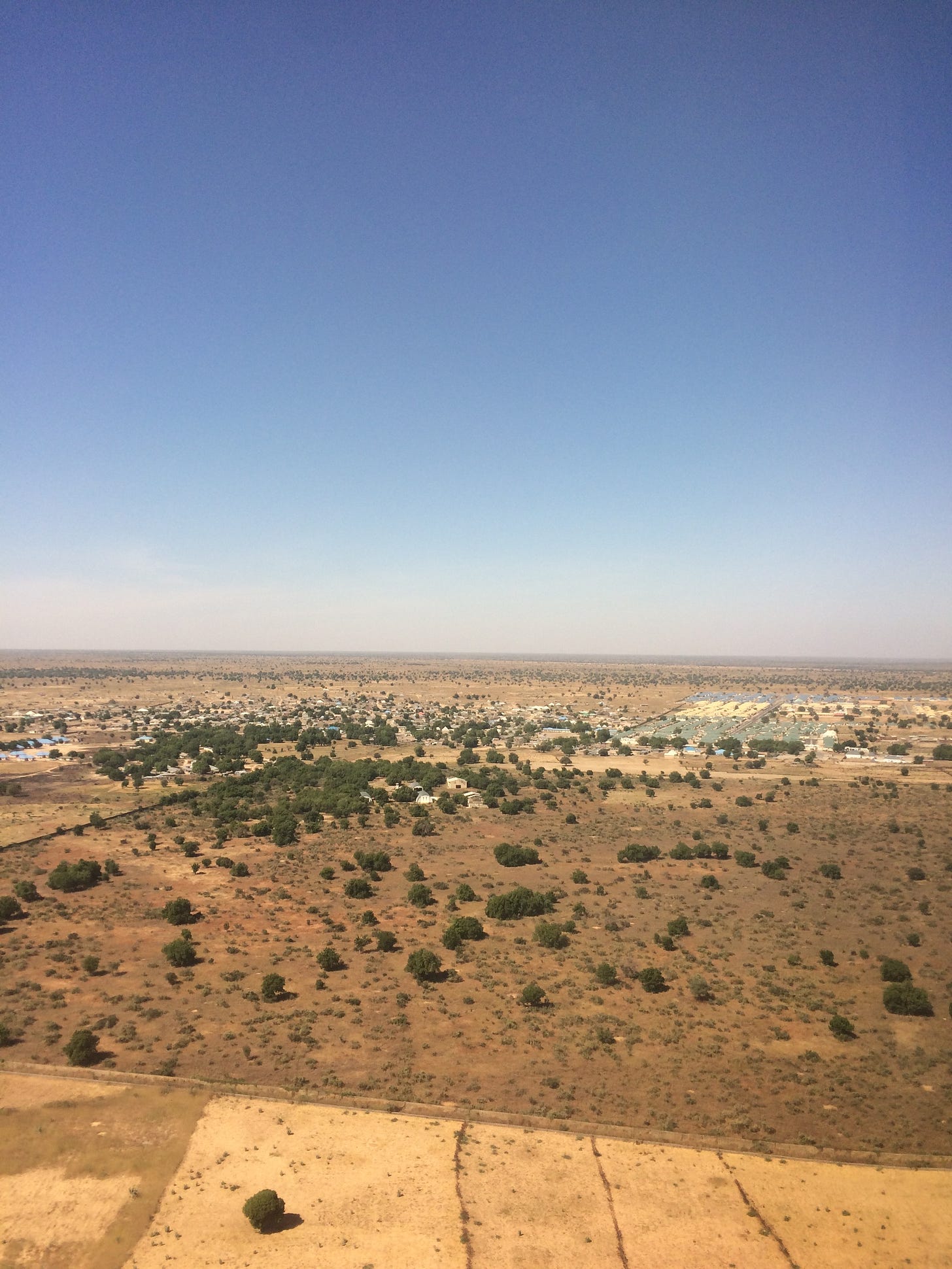Bringing Back the Girls, Again
Maiduguri, the capitol city of Borno state, in northeast Nigeria, is a hard place. It’s poor. Today there is little industry, and few agricultural opportunities, because of climate change and the enduring Boko Haram insurgency. It’s hot and dusty, especially in the summer. Forty degrees Celsius. Asphalt feels like it’s burning the soles of your shoes. There are few clouds in the sky, ever. It doesn’t rain. There is little water, outside of the rapidly shrinking Lake Chad, so it’s dry. And its flat in every direction. At peak daytime heat I can see a shimmer in the distance, like hot air dancing. Or maybe that’s the gasoline in the air from the burning car on the side of the road. Grey smoke billowing into the sky
This is where Boko Haram was born. The group that displaced people and kidnapped girls (about 90 of the famed Chibok girls are still missing, over a decade after Michelle Obama drew attention to their plight). It’s where I helped the US government develop the relationships necessary to understand the local process for demobilizing women from Boko Haram. Some small part of my work may have fed into Operation Safe Corridor, according to a few people I have spoken with over the years. In 2016, a Nigerian presidential directive established Operation Safe Corridor, as a rehabilitation and reintegration program for ex-combatants affiliated with Boko Haram/IS West Africa. Through this nationally endorsed demobilization, disassociation, reintegration, and reconciliation plan, the United Nations Development Programme reported that nearly 3,500 people (including 1450 women) had reintegrated into their communities. But there are lingering concerns that returnees stick to the group’s ideologies. And communities can be slow in accepting returnees.
Across the continent, in Mozambique, a similar story is unfolding. In late June, an Islamic insurgency, initially dubbed Al-Shabaab or Al-Sunnah Wal-Jamâa, kidnapped 120 girls in the northern Mozambican province of Cabo Delgado. This is in addition to several hundred other women and girls it has kidnapped over the last five years.
Like Boko Haram (but unlike Somalia’s Al-Shabaab, from which the group initially took its name), the Mozambican insurgents have become an independent province of the Islamic State (ISM). This organization likely emerged in 2007 in Balama, in the southwestern corner of Cabo Delgado province. It was founded by religious Muslim men who took issue with the role of the secular state in Muslim life. Over ten years, it built itself up in eight districts of Cabo Delgado. State repression of the group before 2017, to protect a nascent liquified natural gas project, seems to have pushed the group to armed violence. Which drove further staterepression. It didn’t help that the group systematically targeted civilians—state security forces have as well, but to a lesser extent).
I have never visited Mozambique, and don’t have any special insight on the local conflict itself. But, as an outside observer, there are a few trends that concern me, mostly because they are retreads of other insurgencies. Which, to me at least, means that outcomes in Mozambique will mirror similar conflicts. First, this is a long-running and metastasizing conflict. The most vital element of the conflict is the IS branding and the international linkages the group has, like those with the Allied Democratic Forces in DRC. These will provide succor to the group. Apparently, Mozambique is locked in as the 17th most terrorism affected country in the world (it had one of the larger increases in terrorism deaths last year). And the group continues to capture and control territory. It displaced 200,000 people in the second half of 2024.
Second is the involvement of outside forces relying almost exclusively on violence to ‘beat’ the insurgency. Namely Rwanda. Rwanda makes money and expands its military capacity from giving troops to international peace keeping forces. Indeed, it has become a regional military power as a result. But Rwanda’s involvement in the conflict has not meaningfully altered the realities on the ground. In fact, ISM just changed tactics. Especially vis-à-vis civilians. They are trying to kill fewer, collect ‘taxes’ from people, and spread their own narrative of the conflict. It’s like a low-tech version of what the more well-funded Somalia Al Shabaab does.
Insurgencies tend not to be beaten. We have data on this. At worst they tie, which is a loss for the state. Just think of Vietnam or the Taliban. Or Boko Haram in Nigeria or the M23 in neighboring DRC. So, whatever the Rwandan and Mozambican military forces are doing, it won’t achieve too much. And it won’t bring back the kidnapped women and girls. But it will demand more of the US and Europe for no clear purpose. The US has long armed, equipped, and trained the largely feckless Nigerian military. Just like the EU is now supporting Mozambique.
In terms of what’s to be done. I think it is a combination of talks with insurgents. As well as humanitarian and development projects. In short, there need to be options for people in rural and underserved places with few economic opportunities and limited options for social mobility. More options mean fewer people willing to kill for religious reasons.




